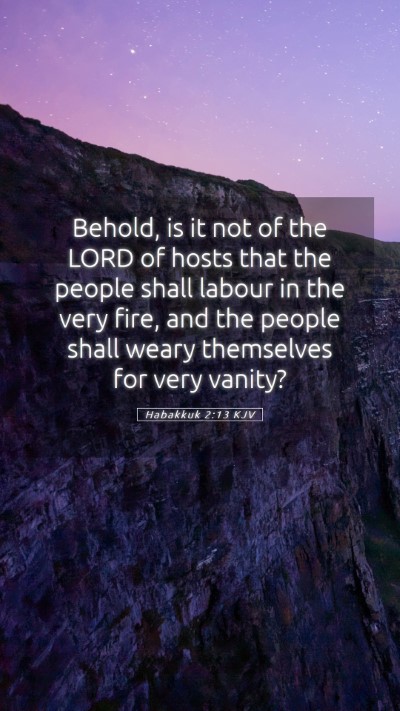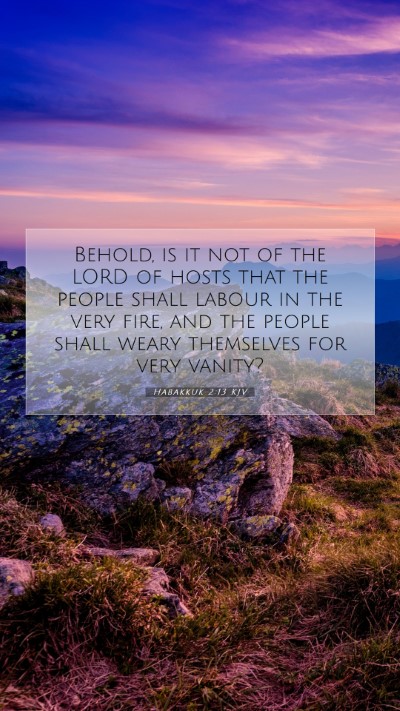Old Testament
Genesis Exodus Leviticus Numbers Deuteronomy Joshua Judges Ruth 1 Samuel 2 Samuel 1 Kings 2 Kings 1 Chronicles 2 Chronicles Ezra Nehemiah Esther Job Psalms Proverbs Ecclesiastes Song of Solomon Isaiah Jeremiah Lamentations Ezekiel Daniel Hosea Joel Amos Obadiah Jonah Micah Nahum Habakkuk Zephaniah Haggai Zechariah MalachiHabakkuk 2:13 Meaning
What is the meaning of Habakkuk 2:13?
Behold, is it not of the LORD of hosts that the people shall labour in the very fire, and the people shall weary themselves for very vanity?
Habakkuk 2:13 Bible Verse Meaning
Understanding Habakkuk 2:13
In the book of Habakkuk, chapter 2, verse 13, we encounter profound insights into the nature of human enterprise and divine judgment. This verse reads:
"Behold, is it not of the LORD of hosts that the people shall labor in the very fire, and the people shall weary themselves for very vanity?" (Habakkuk 2:13, KJV)
Meaning and Interpretation
This verse encapsulates a powerful message about futility and the ultimate sovereignty of God over human endeavors. Here we combine insights from various public domain commentaries:
Matthew Henry's Commentary
Matthew Henry emphasizes that this verse illustrates the futility of labor that does not acknowledge God. He notes that the 'fire' symbolizes destructive judgment and that efforts apart from God are ultimately in vain. The 'vanity' of the people’s toil reflects a broader understanding of life's emptiness when lived without divine purpose.
Albert Barnes' Notes
Albert Barnes points out that the verse reflects how human efforts, when disconnected from the divine will, are futile. He explains the ‘fire’ as a metaphor for judgment, indicating that people labor for what will not endure. This commentary stresses that work without God’s purpose leads to exhaustion and disappointment, reinforcing the need to seek divine direction in all endeavors.
Adam Clarke's Commentary
Adam Clarke adds a historical context, illustrating that Habakkuk points out the judgment upon Babylon. He emphasizes that the people labor in vain when their focus is not aligned with God’s will. Clarke interprets the fire as a symbol of divine wrath, which eventually consumes efforts that are not rooted in righteousness.
Key Themes
- The Sovereignty of God: This verse underlines that all human efforts exist under God's watchful eye.
- Futility of Labor: Labor not connected to God leads to emptiness and judgment.
- Call to Acknowledge Divine Purpose: A reminder to seek God's purpose in our daily activities.
Bible Study Insights
Habakkuk 2:13 encourages readers to reflect on their lives and the intentions behind their work. For those involved in Bible study groups or seeking Bible study materials, this verse serves as a relevant topic for discussion, exploring how daily tasks and long-term goals evaluate against divine principles.
Application to Daily Life
Understanding this scripture requires looking beyond mere actions to their purpose. It invites believers to consider:
- Are my efforts aligned with God’s will?
- What are the motivations behind my daily labor?
- How can I seek God’s guidance in my decisions?
Cross References
Consider these related Bible verses that expand on similar themes:
- Ecclesiastes 1:2: "Vanity of vanities; all is vanity."
- Proverbs 10:22: "The blessing of the Lord, it maketh rich, and he addeth no sorrow with it."
- 1 Corinthians 3:13: "Every man's work shall be made manifest; for the day shall declare it."
Final Thoughts
In summary, Habakkuk 2:13 presents a profound commentary on human endeavors devoid of divine input, emphasizing the necessity of aligning our efforts with God’s will. This understanding invites believers to engage deeply with Scripture and reflect on the true purpose behind their work and aspirations.
Explore More
For those interested in going further, consider using various Bible study tools or engaging in online Bible study platforms that offer deeper insights into verses like Habakkuk 2:13, along with other passages throughout the Bible.


